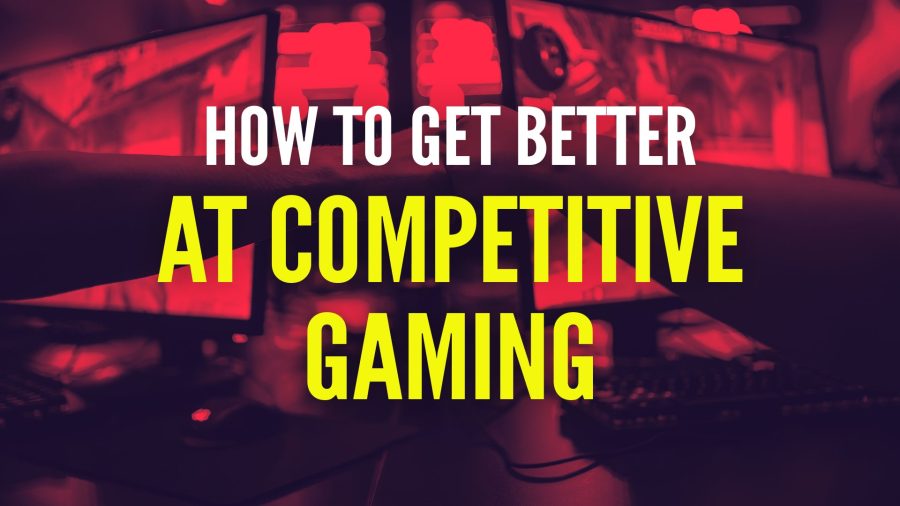What is competitive gaming?
Most people understand competitive gaming as playing games with the idea of being the best they can be. That’s not wrong, but gamers know that this has no borders; sometimes, competitive gaming is just playing the best you can. In general, enhancing your skills will take lots of time, discipline, and dedication.
There are different play styles among the esports industry: individual games, team-based games, cooperative games… Whichever you choose, your gaming skills will be very important to achieve your goals.
The level of your competitive gaming depends on your skills and goals: just trying to be the best you can, or striving to reach a professional level. In any case, you will need game knowledge, ability, discipline, motivation, and lots of time.
The most competitive games in the esports industry
It would be unfair to just name the top five most competitive games in the esports industry; this is something personal. Therefore, let’s focus on their approaches, as naturally as possible. Remember that the goal is to try to list the most competitive and well-known games, not just the most competitive game in the universe — there are many of them.
First-person shooter: Counter-Strike: Global Offensive
Valve Corporations has made multiple updates in the Counter-Strike franchise, and this is the latest one. Every person that played Counter-Strike knows that it’s a highly competitive game: grinding your in-game ranking can take months or even years, depending on the level you are. Each team has six players, and a competitive match normally involves up to 15 rounds.
You need to outperform your opponents by just being better: at aiming, tactics, and strategizing. CS:GO is a great way to improve your micro and macro awareness and skills as you decide to go to someplace or avoid that same place, aim, and coordinate with your team. This requires a deep understanding of the game, avoiding committing the same mistakes as your opposition, and lots of practice.
There are many first-person shooters available in the gaming market, such as Overwatch, Team Fortress 2, PUBG, Fortnite, and others. Their goals are fairly similar, despite some of them being very different games.
MOBA: League of Legends and Dota 2
League of Legends has a wide professional scene along with many casual players, and it’s very competitive for both. However, elite players at the competitive scene play differently from your standard game: they have such coordination, communication skills, and a high understanding of the game and its objectives that sometimes a normal player can’t even keep up with the professional decision-making process.
In LoL, your objective is to destroy the enemy team’s Nexus, and you get kills, assists, and deaths to maneuver the in-game currency: gold. Gold allows you to purchase better items to overcome the opposition. The game is played between two teams composed of five members each. Every player has a different role in the game.

Don’t be fooled by the apparent simplicity: LoL requires a good amount of skill and, despite being a team-based game, performing well individually is key. League of Legends gaming tournaments can be huge Tier-1 events or local-based grassroots tournaments; and to participate and succeed, you can only improve with time and studying. Some players opt for LoL boosting to hone their skills against higher tiered opponents early on and increase their chances of success in these events in the future.
In this category, we can give an honorable mention to Dota 2, which requires similar skills. Dota 2 has the highest prize money across all the esports scene, with The International 10 being the highest-paid event ever: over $40 million were distributed there.
Other titles and categories
Those are the games that are the most competitive and well-known in their categories. But there are many others, such as Rocket League, Fortnite, PUBG: Mobile, Rocket League, Chess, and many others. Remember: playing competitively requires the best of your mental game, and to do that, competitive gamers generally follow a lot of rules. Building good habits can help you to be a more resilient gamer, which is the key to strike success.
It’s interesting to remember that mobile games are charting off-the-hills today, and don’t think that those games have a different approach towards the competitive scene, or that you can forget about discipline on the vague idea that they’re easier than PC games. On the contrary, they do require meditation, thinking, communication skills, and good habits, just the same as the others. Let’s dive into these characteristics!
Competitive games require physical health
Physical health can be decisive in enhancing your gaming abilities. Performing well at video games requires some physical activity — do what you like the most, but don’t think that a sedentary lifestyle will do well for you. Go for a walk in the morning, or do some gym in the evening — as long as you’re moving your body, it’s a good sign, and will also help in other aspects of your life.
One of the most interesting aspects of competitive games is that it may not be enough to just be very good at them, but keeping that form for the next months or years. In this sense, paying some attention to your physical health can only improve your performance.
At the very least, doing a physical activity helps you to live longer, so you’ll be able to extend your reign! Jokes aside, many professional esports athletes think that doing a physical activity helps you to be a better gamer, so you should try it out.
Playing games vs. mental health: How to balance it
Most video game professionals understand that playing games can be bad for them if it precludes them from doing other activities. While some mention physical health, in general, each competitive game poses its own problems and stresses. So, playing a video game can be exactly what you need to improve your multitasking skills, muscle memory, etc.
Improve your memory
In most games, critical thinking is key, but sometimes you’ll need to just remember what key video game players do in some circumstances. Therefore, recognizing patterns is an important step towards getting better at competitive games — what would the best player do?
Online tournaments help to act in the same manner as pros, but can you remember everything from each game? Probably not. However, you can use your gaming skills to get better at this and also become more attentive towards people you care about: remembering their names and birthdays, for instance. It’s not guaranteed, but gaming does help.
Social skills
Competitive gaming as a whole depends heavily upon communication skills, be it in the game, while spending time with your friends, or quality time with the community. Use your free time to develop, stay motivated, or make new friends — this is a great idea to enhance your gaming capabilities.
If you’re a shy person, gaming can help you to connect with other players — gamers like you, and use your game time much better: you’re developing an important part of your life and professional career, even though they might be not related to games. This is the same thing as creating a network. You’ll have to work hard to find better gamers and the most awesome people. But they’re there, just like you!
Better reaction time
Sometimes, a decision takes less than a second — and that decision will make your team either triumph or lose.
Competitive games help people who struggle to make a decision or choose between options. Video games can improve it, and you are welcome to use them as a personal life enhancement.
It takes time… And requires patience
Don’t think you’ll become Faker or Magnus Carlsen out of nowhere. Developing your gaming skills takes a lot of time, practice, and sometimes you’ll see yourself at awkward spots, lacking confidence, and facing other personal challenges. Don’t let these things get the best of you — stay in touch with the outside world as well.
Looking at your matches and improving at the things you missed when you lost a game is very important. Also, register for your first tournament: this will create tension inside you that you will feel forever, and breaking that barrier is very important.
Don’t think that you will never improve: gaming skills are usually slow to develop. Be patient, disciplined, communicate with your team or with people within your community, and the results should come.
How to handle tilt
Tilt happens when a machine stops working because you’ve punched it a lot (mostly pinball machines). In online games, this happens when you’re very stressed out, and people (teammates, yourself, etc.) keep “punching” you, either by criticizing your plays, or when you’re being shut down many times.
The gaming experience can be heavily impacted by this factor. Your critical thinking is being nullified because you’re angry. So, to handle tilt, the steps are:
- Identify that you’re tilted
- Think as positively as you can during the game — it’s the only way to not freak out
- Give yourself a break. Go walk for ten minutes, or something
- Resume playing only when you’ve calmed down — if you haven’t, don’t play the game again, don’t replay analysis, don’t do anything. Just go elsewhere
Handling tilt is a crucial step to enhance your gaming skills and even develop a gaming career. Video games can be infuriating while they should be fun — if they just make you angry, consider stopping for a while.
Doing your best: How to play better
The keyword here is discipline. Play every game as if it were the world final: certain games will reward you sooner rather than later, but most won’t let you increase your skill level by just doing this. However, if you play every game at giving it your all, the basic knowledge will be sure to come; you’ll get a better reaction speed, notice a big difference from games you didn’t try your best, avoid missing the same things, and everything will come together.
That requires analyzing your games, rewatching them, and sometimes, getting angry at yourself. In team games, you should recognize your own mistakes instead of just blaming teammates; while they might, indeed, be far from your level, you should win most games in that case. Each player has their unique gaming skills, so don’t fall into the trap of thinking that you’re better than others — to be a better gamer, you should recognize your own mistakes and understand that each player approaches the game differently.
You don’t need to be the best player in the world… Sometimes
To be very honest with you, it’s really hard to achieve a spot among the world’s best. However, you shouldn’t think you’ll never do it: your skill level will improve with time and dedication, so why not dream?
If you’re stuck in your gaming career, consider tiny steps such as solving puzzles, playing traditional sports, and giving your mind some time to breathe. You don’t need to be the best player ever — except if you’re in a game. Then, do your best and beyond, even in losing situations.
In conclusion
Being good at video games is a way to flex your skills towards other players… (just kidding, don’t do that). Video games are a good hobby, and they provide improvement in general life. However, like traditional sports, simply playing the game isn’t enough if you’re aspiring to higher ranks: your gaming skills, alongside other aspects, need to develop to be a competitive gamer. You will need a lot of conditions to be better at competitive gaming, but when they’re met, it can help you with a myriad of soft life skills.
Professional gaming takes it to another level. To take your part at the scene, you will need gaming abilities, social abilities, physical abilities, and game-specific skills. Emulating professionals’ habits can be a tough experience. It’s a hard path, but it’s worth it. In the next games, you will already be much stronger, and that is the secret of improving at competitive games: just be the best version of yourself, and we will see where this will lead. For more information: https://weplayholding.com/blog/






 Your total news and information resource for all things Science, Technology, Engineering / Mathematics, Art, and Medicine / Health.
Your total news and information resource for all things Science, Technology, Engineering / Mathematics, Art, and Medicine / Health.
Leave a Comment